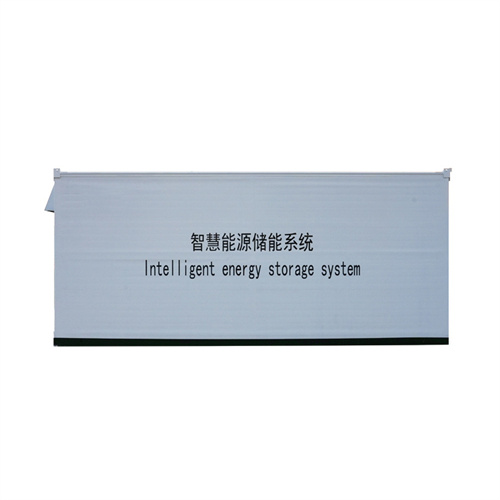
Prospective life cycle assessment of recycling systems for spent
The difference between Case c-2 and c-3 is the Al frame recycling. In Case c-2, the collected spent PV panels are treated with intermediate treatment and landfill without Al

DualSun: French manufacturer of hybrid and PV solar panels
For the solar panel / heat pump heat solution, the Dualsun SPRING panel produces 4 times more energy per m2 than a standard photovoltaic panel. For all types of buildings and sectors. The

End-of-life management: Solar Photovoltaic Panels
This report is the first-ever projection of PV panel waste volumes to 2050. It highlights that recycling or repurposing solar PV panels at the end of their roughly 30-year lifetime can unlock an estimated stock of 78 million

Review of Analysis of Structural Deformation of Solar
Solar PV systems is a new type of energy that is being developed for use in ships in recent years. However, Solar photovoltaics are affected by many kinds of loads such as static loads and wind

Comprehensive Review of Crystalline Silicon Solar Panel Recycling:
This review addresses the growing need for the efficient recycling of crystalline silicon photovoltaic modules (PVMs), in the context of global solar energy adoption and the

Thermal delamination of end-of-life crystalline silicon
Thermal delamination – meaning the removal of polymers from the module structure by a thermal process – as a first step in the recycling of crystalline silicon (c-Si) photovoltaic (PV) modules in order to enable the

(PDF) An overview of solar photovoltaic panels'' end
The EU Waste of Electrical and Electronic Equipment (WEEE) Directive entails all producers supplying PV panels to the EU market to finance the costs of collecting and recycling EOL PV panels in

Waste Water Treatment Systems for the Photovoltaic
Acid Waste Neutralization (AWN) systems adjust the pH of process waste water to within acceptable limits (typically 6 – 9) before discharging to the facility sewer connection. Reagent chemicals such as Caustic Soda and Sulfuric Acid are

Feasibility of using photovoltaic solar energy for water treatment
Regarding to current national market information, a polycrystalline 400 W photovoltaic panel was chosen at USD 168.6 and a cost of 200 Ah gel batteries of USD 400. Figure 4 shows the cost

Environmentally Friendly Photovoltaic Waste
This mechanical crushing and sorting recycling technology is simple to operate and low-cost, and can effectively recycle various valuable materials in solar panels, reducing resource waste and environmental

Simulation Study on the Motion of Dust Particles in Traveling Wave
Photovoltaic power plants are usually established in desert areas far from the crowd, where sand and dust pollution is serious, and it is easy to accumulate dust particles on

An Overview of Cleaning and Prevention Processes for Enhancing
The energy produced by solar photovoltaic (SPV) modules is directly connected with the solar accessible irradiance, spectral content, different variables like environmental and

Sustainable Treatment of Spent Photovoltaic Solar Panels Using
According to a study by Bošnjaković et al. (2023), legislation and equipment geared towards the treatment of spent solar panels modules are rapidly developing in China, with the first

Sustainable Treatment of Spent Photovoltaic Solar
According to a study by Bošnjaković et al. (2023), legislation and equipment geared towards the treatment of spent solar panels modules are rapidly developing in China, with the first treatment demonstration constructed in
6 FAQs about [Photovoltaic panel de-wave treatment equipment]
What is a photovoltaic-thermal (PVT) system?
Recent research has focused on the photovoltaic–thermal (PVT) system, in which heat is provided by thermal collectors while electricity is produced by photovoltaic panels (Elminshawy et al. 2020; El-Agouz et al. 2022).
Can solar PV panels be repurposed by 2050?
This report is the first-ever projection of PV panel waste volumes to 2050. It highlights that recycling or repurposing solar PV panels at the end of their roughly 30-year lifetime can unlock an estimated stock of 78 million tonnes of raw materials and other valuable components globally by 2050.
Do PV panels need end-of-life treatment?
Based on the expected functional lifetime of such installations, several authors have predicted the volumes of PV panels that will require end-of-life (EOL) treatment in the years to come , , .
What is thermal delamination?
Thermal delamination – meaning the removal of polymers from the module structure by a thermal process – as a first step in the recycling of crystalline silicon (c-Si) photovoltaic (PV) modules in order to enable the subsequent recovery of secondary raw materials was investigated.
Can photovoltaic systems be used for desalination?
Besides, this review reveals the significant developments in the use of photovoltaic system as a source of electric energy for various desalination technologies, especially their use with hybrid sources, such as wind turbines, thermal solar tubulars, and hydrogen fuel cells. These studies and research mainly focused on reverse osmosis technology.
Can crystalline silicon be recovered from photovoltaic modules?
Klugmann-Radziemska E, Ostrowski P (2010) Chemical treatment of crystalline silicon solar cells as a method of recovering pure silicon from photovoltaic modules. Renewable Energy 35: 1751–1759. Komoto K, Lee J-S (2018) End-of-life management of photovoltaic panels: Trends in PV module recycling technologies. Report IEA-PVPS T12-10:2018.